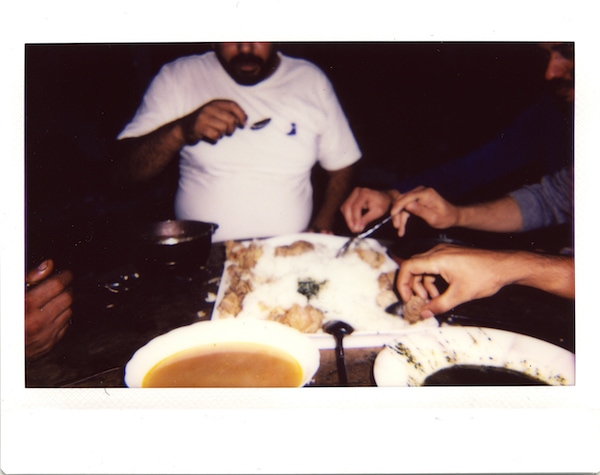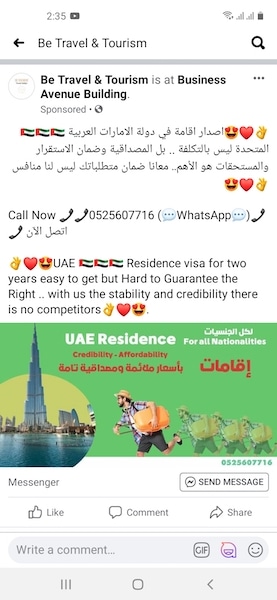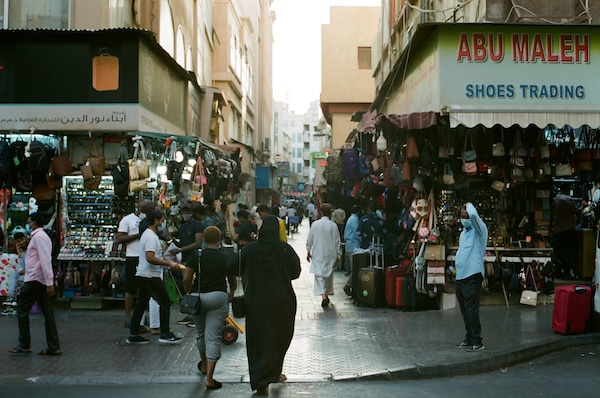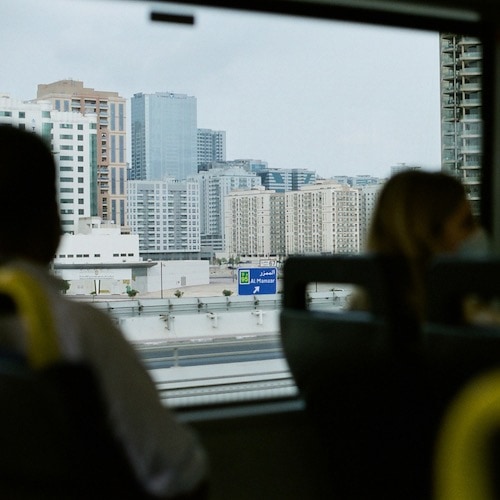Part Three: A Travel Agent selling Freedom
For the second half of my stay, I lived in a shared accommodation of mostly Egyptian men in Ajman, which is effectively a suburban extension of Dubai. Ajman is cheaper, less flashy and fancy, quite lively and liveable, and with a much larger proportion of Arab migrants than in Dubai, however without the conservative Islamic regime of public morals that marks Sharjah as the family-oriented and more Arabic counterpoint to hedonistic and South Asian-dominated Dubai. Three of my roommates worked in a specialised car workshop; all others were jobseekers, and there was quite some fluctuation with people coming and going.

One of the workshop’s employees is B. He has lived in Ajman since 2013, while his wife and two children are staying in his home village in Egypt. He is the boss of the room: he holds the contract with the landlady (who lets the three-bedroom apartment room by room to Egyptians, Ethiopians, Sudanese, and West Africans who share the kitchen and bathrooms in sometimes amicable, and often tense relations), and collects rent from the inhabitants of the room. He comes from the same village as T., and his room is a common first stopover for people arriving from the village in search for a job. T. lived in B.’s room for three weeks until he moved to an accommodation near his new job in Dubai. At the same time, others kept arriving, all of them with their nerves depleted and their sleep irregular, similar to T. at the time of his arrival.
First of them in the order of arrival was N. from a city in the Nile Delta, arriving in mid-December, because his income as a private driver in Egypt could not support his family. He was looking for any work. But it was hard to find. He returned from a construction site in Abu Dhabi after three days because the accommodation was so crowded and bad that he couldn’t sleep. Another job at a construction site in Ajman only needed him for two days to replace a missing worker, and then didn’t require his services any more. After a long search, he got an offer as a helper at another construction site, but he would need to have a visa of his own. He ended up borrowing and paying a significant sum of money to get a residence permit with a fictional contract through a travel agency.
He was not the only one doing business with the travel agent. F. from T.’s village arrived in early January, and has a better starting position. He owned a car showroom in the rural region where he comes from, but became indebted in the wake of a stressful and destructive inheritance conflict, and finally sold a part of his business and his private car to pay off his debts, and travelled to Dubai on a three-month tourist visa. While T. and his former colleagues at the airport as well as N. are looking for salaried labour, F. seeks to make a new beginning with freelance work, first as a driver and then hopefully again as a car salesman. This is a path that requires a longer period of preparation and search, and higher expenses. Many others cannot afford it – among them N., who worked as a driver in Egypt but at least at the moment is unable to afford a UAE driver’s licence. F.’s first step was to get a residence permit of his own. In the UAE, residence permits are linked with work contracts (with few upscale exceptions), but F. needed a residence permit that allows him to work freely. After acquiring one, he can do the theory lessons and driving test for a UAE driver’s licence because his Egyptian licence is not recognised here. And this brought him to the same travel agency.
But how did N. and F. end up at this travel agency in the first place? It was thanks to D. from Morocco, the only non-Egyptian inhabitant of our shared room. D. arrived in Dubai over a year ago with the aim to get a good job with a good salary, and to use that as a basis to apply for a tourist visa to Canada and the United States. But Covid-19 intervened, and he has spent nearly a year mostly out of work, but holding a residence visa that identifies him as manager in a company – the same company in fact where he took us for a visit one afternoon in mid-January.

We were welcomed by G., a friendly, playful and compelling Egyptian woman in her thirties, who explained to us the deal. For a down-payment of 4000 dirhams, and a payment of further 5000 dirhams in instalments over 4 months, her company provides a fictional contract (which is provided by a company that sells its unused quota for work permits to the travel agent) and a residence permit for two years. The company acts as the customer’s sponsor (kafil), and in her sales pitch, G. explained that they do all the paperwork you need, they will look after you, and whenever you need the sponsor’s agreement for something, the company will always agree. The service is called “a free visa”, which does not refer to the price, which is more than twice the cost of a regular residence permit.
The service is called “a free visa”, which does not refer to the price, which is more than twice the cost of a regular residence permit.
N. could hardly afford the service, but the only serious job offer he received required him to organise his own residence permit. So he had no choice but to agree to a down-payment and monthly instalments that allow him to eat and drink for the next four months, but the rest of his salary will go to pay for the visa. Only after half a year after his arrival can he expect to send any money to his wife in Egypt. G. told him that the 2000 AED salary he was offered at his prospective job would be very little for a free visa. She advised that he should stay in that job only until he finds a better one, “and that’s the advantage of a free visa,” she reminded us: “The freedom.”
Such visas are widely advertised on social media and in posted signs on street corners, and they are in much demand because they liberate one from the predicaments that often arise when one’s employer is also the kafil and in that capacity can cause various troubles and delays (as happened to the four men at the security company in Abu Dhabi in the previous part of this essay). For some, like F. who wants to make a new beginning as a car dealer, they present a perfect opportunity. For others however, among them N., a free visa is an expensive necessity in the absence of regular paths to a contract with a visa. It adds to an already heavy load on the shoulders of men who see their main role and value in their ability to provide for their households, and build a future for their children.
A., also from T.’s village and friends with him, arrived in early January, originally on transit. His plan was to spend two weeks here to continue to Kuwait – direct travel from Egypt is banned by Kuwait, so travellers arriving from Egypt must first spend 14 days in Dubai. However, he immediately liked Dubai much more, and decided to stay. The decision was aided by the fact that the flight to Kuwait would have been very expensive; also, the situation with jobs in Kuwait did not appear to be any better, and he had to expect an expensive 14-days home quarantine on arrival. Kuwait, unlike Dubai, is not staying open and welcoming visitors in the middle of the pandemic. Instead, it is doing all it can to prevent the spread of the virus. This makes entry to Kuwait difficult and costly. Staying in the Dubai metropolitan area is easy in comparison, with a tourist visa that can be either renewed or transferred into a work visa for a fee. But A. soon experienced a great deal of frustration when he realised that in the few job offers in restaurants (his field of work) he could find, the salaries were low, accommodation was expensive, and the overall cost of living in the Dubai metropolitan region is higher than in Kuwait. “In this country, you can live,” he commented to me, referring to Dubai’s quality as a place where many migrants prefer to establish a family and live long-term if they can afford to, “but you can’t save money here.” Even so, financial necessity forced him to stay, but he faces huge pressure after refusing two restaurant jobs that in his view were too poorly paid to provide for his pregnant wife and soon school-age son in the village in Egypt.
The salaries were low, accommodation was expensive, and the overall cost of living in the Dubai metropolitan region is higher than in Kuwait.

B. challenged what he saw as A. being picky: “In this country, it’s always awful at first.” In his view, a new arrival in the working-class level in Dubai has no choice but to take any work available, and then slowly work themselves upward. His colleague S. argued on similar terms, and claimed the ability to endure hard work under tough conditions as a marker of manliness: “Don’t be arrogant towards your livelihood. You gotta be a man in the situation you’re in.” Their work is hard and dirty. B. is the foreman of a welding team, and at the end of the day, his eyes are red from looking into the welding flames – not his own, which he sees through protective glasses, but those around him that he sees whenever he turns his head. They leave the accommodation at 7 in the morning and return between 7 and 9 in the evening, tired and hungry, and they are usually fast asleep by midnight, unlike the jobseekers who tend to stay up late and sleep until noon. But they are lucky not having to face the anxiety of not knowing if and when they may finally find work that will be enough to provide.
“In this country, it’s always awful at first.”
The jobseekers I met were taking major financial risks to fulfil the most important marker of a man in a patriarchal society: being able to provide livelihood, in Egyptian Arabic akl eish – “the eating of bread” – for their family. It is understood to be an exclusively male role, and even while many Egyptian women actually work and in fact provide for their families, the moral value of male provider role is held high, and many see it as a religious obligation. Being a jobseeker in Dubai at the time of Covid is an opportunity to prove oneself as a man, to provide, even during a crisis. But it also is a danger of failure that will result in one’s family having no income, one’s wife having to rely on her own kin, one’s children having no money for school fees or private tutoring. It is the danger of a social death as a man, and it looms big over the men I met. They all spoke of emotional anxiety and nervous tension, and they slept badly (unlike those at work who slept early). Not being able to work and provide was taking them to their limits in a way in which hard work seldom can.
Being a jobseeker in Dubai at the time of Covid is an opportunity to prove oneself as a man, to provide, even during a crisis.
In the next and final Part Four, infection numbers are increasing, which adds to the anxiety. Read it here.
All images by author.





